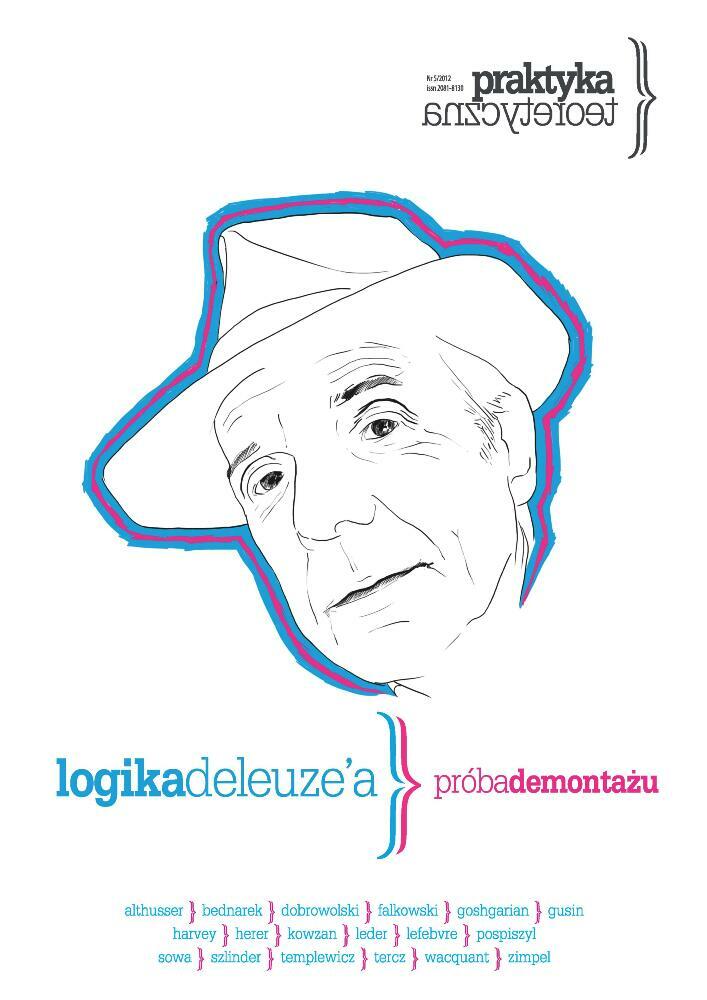Abstrakt
Nietzscheańska krytyka myślenia teistycznego wydaje się jedną z najistotniejszych inspiracji filozofii Gillesa Deleuze, a perspektywa stawania się bezbożnym może rozjaśniać intencje, jakie stoją za jego noologiczną krytyką „tradycyjnego obrazu myśli”, czyli takiego paradygmatu refleksji,
który nieuchronnie każdą myśl czyni „zbożną”, „kryptoteologiczną”, a każdą prawdę – „absolutną”. Przeciw takiej kapłańskiej filozofii „poszukującej prawdy”, Deleuze proponuje swą własną nieortodoksyjną wizję „wymyślania prawd”, twórczo wykraczającego poza różnicę fikcja/prawda. Prowadzi to również do zakwestionowania dotychczasowego sensu sensu jako struktury teomorficznej: sens miałby być niejako „duszą” rzeczy, a postulat „odwrócenia platonizmu” można zrealizować dopiero wtedy, gdy sens miast duszą stanie się „ciałem”. Choć zabiegi Deleuze’a i jego reinterpretacja sensu sensu mogą zdawać się aż nazbyt eksperymentalne, to jednak gdy przestaniemy traktować je jako „przekonania”, a zrozumiemy, że są raczej figurami czy ruchami w grze, odkryjemy ich subwersywny potencjał inspiracji.
Bibliografia
Deleuze G. 1997. Różnica i powtórzenie. Warszawa: Wydawnictwo KR.
Deleuze G. 2011. Logika sensu. Warszawa: Wydawnictwo Naukowe PWN.
Deleuze G., Guattari F. 1996. A Thousand Plateaus. London: University of Minnesota Press.
Descartes R. 2001. Medytacje o pierwszej filozofii. Kęty: Wydawnictwo Marek Derewiecki.
Nietzsche F. 1997. Z genealogii moralności. Kraków: Znak.
Nietzsche F. 2008. Radosna wiedza. Gdańsk: Słowo/obraz terytoria.
Licencja
Autorzy:
„Praktyka Teoretyczna” jest pismem, które chce realizować idee wolnego dostępu do wiedzy i poszerzania domeny dobra wspólnego. Ma służyć rozwojowi nauki i krytycznej refleksji w Polsce i na świecie w imię idei wolnego dostępu do wiedzy (Open Access). Całe pismo jest udostępniane za darmo w Internecie na warunkach licencji CC-BY-NC-SA (Uznanie autorstwa-Użycie niekomercyjne-Na tych samych warunkach 4.0 Międzynarodowe) w wersji 4.0 (szczegółowe warunki: http://creativecommons.org/licenses/by-nc-sa/4.0/). Artykuły w nim zamieszczone mogą być dowolnie przechowywane, kopiowane, drukowane, rozpowszechniane i wykorzystywane do celów naukowo-dydaktycznych przy zachowaniu warunków licencji. Apelujemy tylko o uznanie autorstwa i podanie źródła w myśl przyjętych w środowisku naukowym standardów.
Nie ma natomiast możliwości komercyjnego wykorzystania zgromadzonych zasobów bez pisemnej zgody wydawcy. Dostęp do czasopisma nie może być dystrybuowany za opłatą czy w jakikolwiek inny sposób limitowany przez inne podmioty.
Autorzy tekstów przyjętych do publikacji w czasopiśmie „Praktyka Teoretyczna” są zobowiązani do wypełnienia, podpisania i odesłania na adres redakcji umowy o udzielenie nieodpłatnej licencji do utworów, z zobowiązaniem do udzielania sublicencji CC [PL.pdf, PL.doc, EN.pdf, EN.doc].
Zgodnie z umową, autorzy tekstów opublikowanych w czasopiśmie „Praktyka Teoretyczna” udzielają wydawcy czasopisma niewyłącznej i nieodpłatnej licencji oraz zezwalają na użycie sublicencji Creative Commons Uznanie autorstwa-Użycie niekomercyjne-Na tych samych warunkach 4.0 Międzynarodowe (CC-BY-NC-SA 4.0).
Autorzy zachowują prawa do dalszego, swobodnego rozporządzania utworem.
Autorzy nadsyłanych artykułów powinni upewnić się, czy wykorzystywane przez nich materiały nie są chronione prawami autorskimi na rzecz innych osób i ponoszą odpowiedzialność za ewentualne uchybienia w tym względzie.
